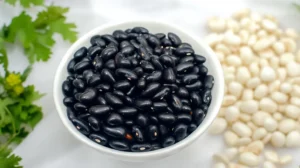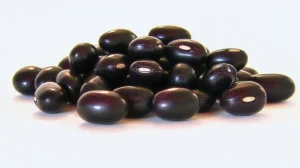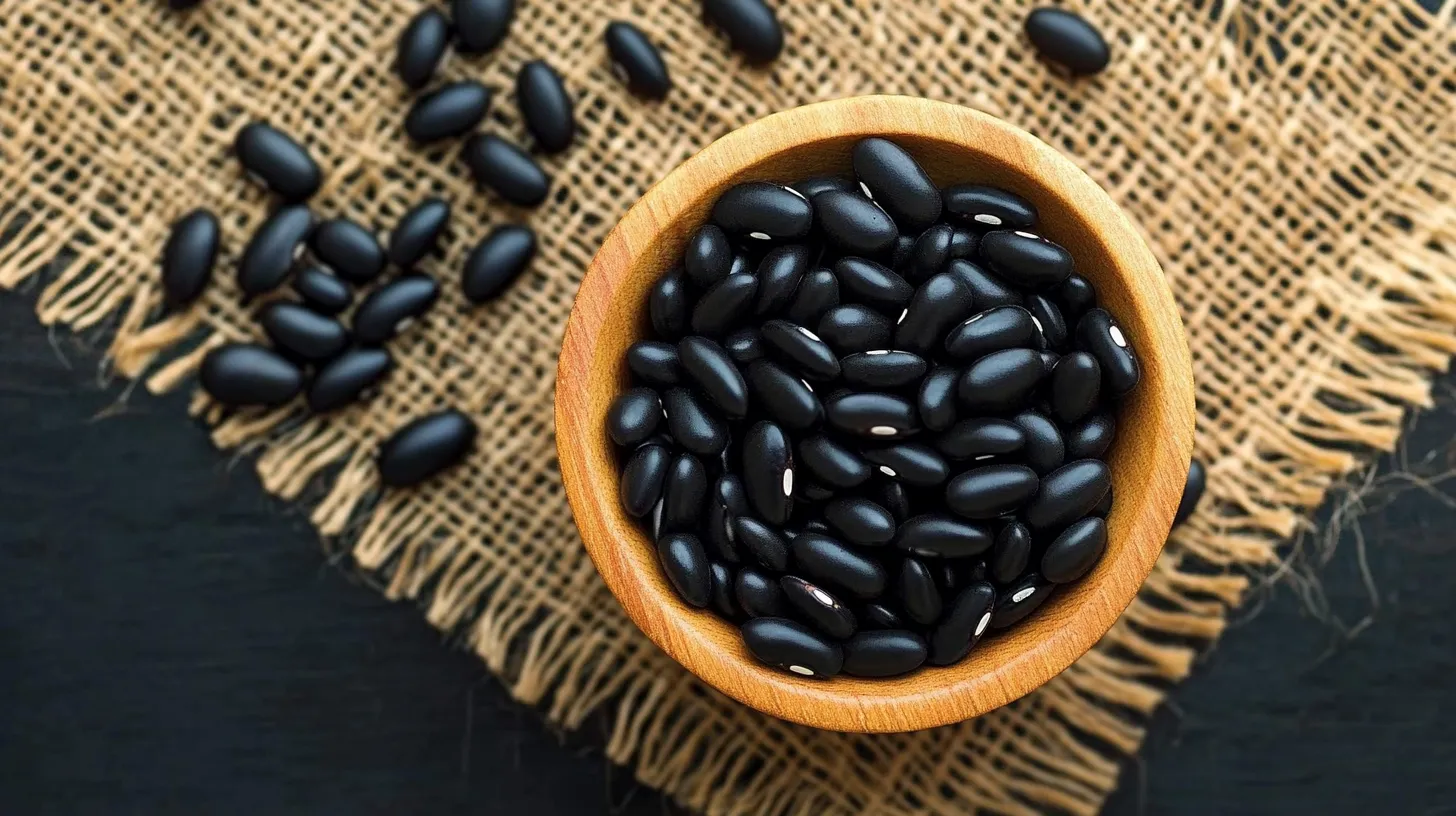Have you ever wondered, “Why does my black bean soup taste bitter?” This common issue can turn a comforting dish into an unappealing experience. Black bean soup, known for its earthy richness and hearty texture, can develop bitterness for several reasons, such as undercooked beans, burnt ingredients, or excessive seasoning.
And what’s more, understanding the causes of bitterness allows you to prevent it, ensuring a flavorful and satisfying soup every time. If you’ve faced this challenge, don’t worry! The solution lies in perfecting preparation, cooking techniques, and flavor balancing.
Let’s uncover the science behind bitterness and the steps you can take to create a perfectly balanced black bean soup. For a detailed guide on making a vibrant and flavorful dish, explore this Purple Black Bean Soup Recipe.

Understanding the Causes of Bitterness in Black Bean Soup
Bitterness in black bean soup can be frustrating, but it’s usually easy to identify the root cause. By understanding these common culprits, you can adjust your cooking process and achieve a perfectly balanced dish every time.
1. Undercooked Beans
Undercooked black beans are a frequent cause of bitterness.
- Why It Happens:
- Black beans contain natural compounds like tannins, which can taste harsh if not fully broken down during cooking.
- Insufficient cooking leaves the beans tough and amplifies their bitter undertones.
- How to Fix It:
- Always cook beans until they are soft and creamy.
- Pre-soak beans for 8–12 hours to help release tannins and shorten cooking time.
Pro Tip: If you’re in a rush, use canned black beans as they are pre-cooked and less likely to taste bitter.
2. Burnt Ingredients
Burning key ingredients like garlic, onions, or spices during the sautéing process can introduce unwanted bitterness.
- Why It Happens:
- Overcooking releases bitter compounds from garlic and onions.
- High heat can scorch spices, especially cumin or paprika.
- How to Avoid It:
- Sauté ingredients on medium heat and stir frequently.
- Keep a close eye on your pot to ensure nothing sticks or burns.
Pro Tip: If you accidentally burn your aromatics, start fresh with new ingredients to avoid transferring bitterness to the soup.
3. Excessive or Low-Quality Seasonings
Sometimes, the spices or broths you use may be the source of bitterness.
- Why It Happens:
- Using too much of strong spices like cumin, oregano, or smoked paprika can overpower the soup.
- Stale spices and low-quality broths often have dull or bitter notes.
- How to Fix It:
- Use high-quality, fresh spices and taste-test before adding more.
- Opt for low-sodium broths to prevent an imbalance in flavors.
Pro Tip: Store spices in a cool, dark place to maintain their freshness and potency.
4. Water Quality and pH Levels
The type of water you use can significantly impact the flavor of your soup.
- Hard Water:
- High mineral content in hard water can enhance bitterness.
- Alkaline Additives:
- Ingredients like baking soda, often added to soften beans, can alter the soup’s pH and flavor.
- Solution:
- Use filtered or bottled water when cooking, and avoid adding too much baking soda.
Pro Tip: A splash of lemon juice or vinegar can help balance out bitter notes caused by water quality.
How to Prevent Bitterness
Preventing bitterness in black bean soup starts with thoughtful preparation, mindful cooking techniques, and the right balance of ingredients. By following these strategies, you can ensure your soup turns out rich and flavorful every time.
1. Soak and Rinse Your Beans
Properly preparing your black beans is the first step to avoiding bitterness.
- Why It Helps:
- Soaking beans helps release tannins and other compounds that contribute to bitterness.
- Rinsing removes excess starch and residue that may affect the flavor.
- How to Do It:
- Rinse dried beans thoroughly under cold water.
- Soak them for 8–12 hours in a large bowl of water.
- Add a pinch of salt or baking soda to the soaking water to enhance tannin removal.
- Drain and rinse the beans before cooking.
Pro Tip: Always discard the soaking water to avoid reintroducing tannins into your soup.
2. Use the Right Cooking Techniques
Cooking your ingredients correctly can make all the difference in flavor.
- Sauté with Care:
- Cook garlic, onions, and spices over medium heat to avoid burning.
- Stir frequently to ensure even cooking.
- Cook Beans Until Tender:
- Simmer beans gently rather than boiling them vigorously.
- Test for doneness by mashing a bean between your fingers; it should be soft and creamy.
Pro Tip: Use a heavy-bottomed pot to prevent hot spots that can lead to burning.
3. Balance the Flavors
If bitterness persists, balancing it with complementary flavors can save your dish.
- Add Sweetness:
- Incorporate naturally sweet ingredients like carrots, sweet potatoes, or a small amount of honey.
- Introduce Acidity:
- Use lime juice, vinegar, or tomatoes to cut through bitterness.
- Include Creamy Elements:
- Stir in coconut milk, sour cream, or yogurt for a smooth, mellow flavor.
Pro Tip: Add these balancing ingredients in small amounts and taste frequently to achieve the perfect flavor.
4. Choose Quality Ingredients
The quality of your spices, beans, and broth directly affects the soup’s flavor.
- Use Fresh Spices:
- Check expiration dates on spices and store them in a cool, dry place.
- Opt for Low-Sodium Broth:
- Avoid broths with artificial additives or excessive salt, as they can intensify bitterness.
Pro Tip: Homemade broth is an excellent alternative for a clean, balanced flavor.
5. Mind Your Water Quality
Water quality plays a surprising role in the final taste of your soup.
- Filter Your Water:
- Use filtered or bottled water to minimize minerals that can enhance bitterness.
- Adjust Alkalinity:
- Avoid overusing alkaline ingredients like baking soda, which can alter the soup’s flavor.
Pro Tip: Add a splash of lemon juice or vinegar during cooking to counteract the effects of hard water.
Enhancing and Customizing Your Black Bean Soup
Black bean soup is not only a comforting classic but also a versatile dish that you can elevate with creative enhancements and customizations. By experimenting with flavors, textures, and garnishes, you can transform your soup into a personalized masterpiece.
1. Experiment with Aromatic Spices
Adding unique spices can take your black bean soup to the next level.
- Ideas for Aromatic Spices:
- Cinnamon: Adds warmth and a subtle sweetness.
- Nutmeg: Creates a rich, earthy undertone.
- Coriander: Introduces a bright, citrusy note.
Pro Tip: Start with small amounts of new spices and taste-test as you go to avoid overpowering the dish.
2. Incorporate Fresh Herbs
Fresh herbs are an easy way to add brightness and balance to your soup.
- Best Options:
- Cilantro: A classic garnish that complements the beans’ earthy flavor.
- Parsley: Adds a fresh, mild herbal touch.
- Green Onions: Brings a pop of color and sharpness.
Pro Tip: Sprinkle herbs on individual servings just before eating to preserve their freshness.
3. Add Texture with Toppings
Toppings can provide crunch, creaminess, or additional flavor to your soup.
- Crunchy Options:
- Roasted pepitas (pumpkin seeds)
- Crushed tortilla chips
- Toasted bread croutons
- Creamy Additions:
- A dollop of sour cream or yogurt
- Slices of ripe avocado
- Drizzle of coconut milk
Pro Tip: Combine contrasting textures—like creamy avocado and crunchy pepitas—for a more dynamic eating experience.
4. Enhance with Sweet and Savory Ingredients
Balancing sweet and savory elements can create a more complex and satisfying flavor profile.
- Sweet Enhancers:
- Roasted corn kernels
- Diced sweet potatoes
- A touch of maple syrup
- Savory Boosters:
- Crumbled feta cheese
- Roasted red peppers
- Sautéed mushrooms
Pro Tip: Use roasted vegetables to add a caramelized sweetness and depth to your soup.
5. Turn It Into a One-Pot Meal
Make your black bean soup heartier by adding proteins or grains.
- Protein Options:
- Shredded chicken or turkey
- Crumbled tofu or tempeh
- Blackened shrimp
- Grain Additions:
- Cooked quinoa or rice
- Barley for a chewy texture
- Farro for a nutty flavor
Pro Tip: Add cooked grains or proteins toward the end of cooking to prevent overcooking and ensure the best texture.

Frequently Asked Questions
1. Why Does My Black Bean Soup Taste Bitter?
Bitterness in black bean soup can occur for several reasons, including:
- Undercooked Beans: Black beans contain natural tannins, which may not break down completely if the beans are not fully cooked.
- Burnt Ingredients: Overcooking garlic, onions, or spices can release bitter compounds that overpower the dish.
- Seasoning Imbalances: Excessive amounts of cumin, oregano, or smoked paprika can dominate the soup’s flavor.
- Water Quality Issues: Hard water with high mineral content or the addition of too much baking soda can alter the soup’s taste and pH balance.
Solution: Focus on soaking beans properly, cooking them thoroughly, and balancing the soup’s flavors to eliminate bitterness.
2. How Can I Fix Bitter Black Bean Soup?
If your soup has turned out bitter, don’t worry—there are several ways to balance the flavors:
- Sweet Additions: Add a small amount of honey, sugar, or naturally sweet vegetables like roasted carrots.
- Acidic Ingredients: A squeeze of lime juice, a splash of vinegar, or a few diced tomatoes can help neutralize bitterness.
- Creamy Elements: Incorporate sour cream, yogurt, or coconut milk for a smoother, milder flavor.
Pro Tip: Add these ingredients gradually and taste-test frequently to avoid overpowering the soup.
3. Does Soaking Beans Prevent Bitterness?
Yes, soaking beans before cooking is an effective way to reduce bitterness.
- Why It Helps:
- Soaking releases tannins and other bitter compounds present in the beans.
- Rinsing the beans after soaking removes additional residues that may contribute to harsh flavors.
Pro Tip: Add a pinch of salt or a small amount of baking soda to the soaking water to enhance tannin removal.
4. Can Spices Make Black Bean Soup Bitter?
Yes, spices can contribute to bitterness if they are overused or not fresh.
- Common Culprits:
- Strong spices like cumin, oregano, and smoked paprika can easily overpower the soup.
- Stale spices lose their freshness and may develop a bitter taste.
Solution: Use fresh, high-quality spices in moderation and taste as you cook to find the right balance.
5. How Does Water Quality Affect Black Bean Soup Flavor?
The water you use can significantly impact the flavor of your soup.
- Hard Water: High levels of minerals in hard water can enhance bitterness.
- Alkaline Water: Adding too much baking soda or using water with high alkalinity can alter the soup’s pH, affecting the taste.
Solution: Use filtered or bottled water for cooking, and balance the pH with a splash of lemon juice or vinegar if needed.
Conclusion: Mastering the Art of Black Bean Soup
Black bean soup is a timeless dish that brings comfort, nutrition, and flavor to the table. But when bitterness sneaks into your bowl, it can completely ruin the experience. Have you ever wondered, “Why does black bean soup taste bitter?” Fortunately, by understanding the reasons behind this common issue and learning how to fix or prevent it, you can create a rich, satisfying meal every time.
First, proper preparation is essential. Thoroughly soaking and rinsing your beans helps remove tannins, which are a frequent cause of bitterness in black bean soup. Additionally, using careful cooking techniques ensures your ingredients don’t burn or overpower the dish. Balancing flavors with sweet, acidic, or creamy additions can further transform a bitter soup into a well-rounded masterpiece.
Moreover, creativity in the kitchen allows you to experiment with aromatic spices, fresh herbs, and unique toppings, elevating your black bean soup to new heights. Whether you’re preparing it for a weeknight meal or a special gathering, the right approach will ensure you deliver a dish that’s both memorable and enjoyable.
Lastly, remember that cooking is both an art and a science. If your black bean soup taste bitter, it’s an opportunity to refine your techniques, try new ingredients, and delight your taste buds. Ready to transform your recipe? Start with fresh ingredients, thoughtful preparation, and these proven tips for a flavorful and perfectly balanced soup.

